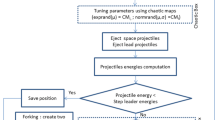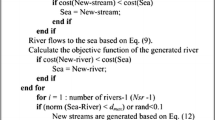Abstract
Optimizing the operations of a multi-reservoir systems are complex because of their larger dimension and convexity of the problem. The advancement of soft computing techniques not only overcomes the drawbacks of conventional techniques but also solves the complex problems in a simple manner. However, if the problem is too complex with hardbound variables, the simple evolutionary algorithm results in slower convergence and sub-optimal solutions. In evolutionary algorithms, the search for global optimum starts from the randomly generated initial population. Thus, initializing the algorithm with a better initial population not only results in faster convergence but also results in global optimal solution. Hence in the present study, chaotic algorithm is used to generate the initial population and coupled with genetic algorithm (GA) to optimize the hydropower production from a multi-reservoir system in India. On comparing the results with simple GA, it is found that the chaotic genetic algorithm (CGA) has produced slightly more hydropower than simple GA in fewer generations and also converged quickly.
Access this chapter
Tax calculation will be finalised at checkout
Purchases are for personal use only
Similar content being viewed by others
References
Wardlaw, R., Sharif, M.: Evaluation of genetic algorithms for optimal reservoir system operation. J. Water Resour. Plann. Manage. 125(1), 25–33 (1999)
Sharif, M., Wardlaw, R.: Multireservoir systems optimization using genetic algorithms: case study. J. Comput. Civ. Eng. 14(4), 255–263 (2000)
Jothiprakash, V., Shanthi, G., Arunkumar, R.: Development of operational policy for a multi-reservoir system in India using genetic algorithm. Water Resour. Manage. 25(10), 2405–2423 (2011)
Yuan, X., Yuan, Y., Zhang, Y.: A hybrid chaotic genetic algorithm for short-term hydro system scheduling. Math. Comput. Simul. 59(4), 319–327 (2002)
Cheng, C.T., Wang, W.C., Xu, D.M., Chau, K.: Optimizing hydropower reservoir operation using hybrid genetic algorithm and chaos. Water Resour. Manage. 22(7), 895–909 (2008)
Han, F., Lu, Q.S.: An improved chaos optimization algorithm and its application in the economic load dispatch problem. Int. J. Compt. Math. 85(6), 969–982 (2008)
May, R.M.: Simple mathematical models with very complicated dynamics. Nature 261(5560), 459–467 (1976)
Huang, X., Fang, G., Gao, Y., Dong, Q.: Chaotic optimal operation of hydropower station with ecology consideration. Energy Power Eng. 2(3), 182–189 (2010)
KHEP: Koyna hydro electric project stage-IV. Irrigation Department, Government of Maharashtra, (2005)
Jothiprakash, V., Arunkumar, R.: Optimization of hydropower reservoir using evolutionary algorithms coupled with chaos. Water Resour. Manage. (2013). doi:10.1007/s11269-013-0265-8, (Published online)
KWDT: Krishna water disputes tribunal: The report of the Krishna water disputes tribunal with the decision. Ministry of water resources, Government of India. New Delhi (2010)
Deb, K.: Multi-objective Optimization Using Evolutionary Algorithm. Wiley, New Jersey (2001)
Williams, G.P.: Chaos Theory Tamed. Joseph Henry Press, Washington, D.C (1997)
Deb, K., Agrawal, R.B.: Simulated binary crossover for continuous search space. Complex Syst. 9, 115–148 (1995)
Loucks, D.P., Stedinger, J.R., Haith, D.A.: Water Resources Systems Planning and Analysis. Prentice Hall Inc, Englewood Cliffs, New Jersey (1981)
Arunkumar, R., Jothiprakash, V.: Optimal reservoir operation for hydropower generation using non-linear programming model. J. Inst. Eng. (India) 93(2), 111–120 (2012)
Acknowledgments
The authors gratefully acknowledge the Ministry of Water Resources, Government of India, New Delhi, for sponsoring this research project. The authors also thank Chief Engineer, KHEP, Executive Engineer, Koyna Dam and Executive Engineer, Kolkewadi Dam for providing the necessary data.
Author information
Authors and Affiliations
Corresponding author
Editor information
Editors and Affiliations
Rights and permissions
Copyright information
© 2014 Springer India
About this paper
Cite this paper
Arunkumar, R., Jothiprakash, V. (2014). Improving the Performance of the Optimization Technique Using Chaotic Algorithm. In: Babu, B., et al. Proceedings of the Second International Conference on Soft Computing for Problem Solving (SocProS 2012), December 28-30, 2012. Advances in Intelligent Systems and Computing, vol 236. Springer, New Delhi. https://doi.org/10.1007/978-81-322-1602-5_27
Download citation
DOI: https://doi.org/10.1007/978-81-322-1602-5_27
Published:
Publisher Name: Springer, New Delhi
Print ISBN: 978-81-322-1601-8
Online ISBN: 978-81-322-1602-5
eBook Packages: EngineeringEngineering (R0)




